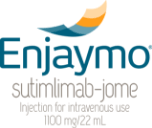Four simple steps to get started with ENJAYMO
Here's how to start your appropriate patients on their ENJAYMO treatment journey
Four simple steps to get started with ENJAYMO
STEP 1: Enroll your patients in ENJAYMO Patient Solutions
ENJAYMO Patient Solutions* is here to support your patients from the start and throughout treatment
PATIENT SUPPORT SERVICES
Patient Support Services may be able to provide your patients with education services, reimbursement services, and related materials
LEARN MOREFINANCIAL ASSISTANCE PROGRAMS
ENJAYMO Financial Assistance Programs may be able to help with the cost of treatment. Access to ENJAYMO at no cost may be available to eligible patients who are uninsured or underinsured. Co-pay assistance may be available for out-of-pocket co-pay or co-insurance costs related to ENJAYMO prescription for eligible patients*
LEARN MORE*The ENJAYMO Patient Solutions Co-Pay Program (the “Program”) is not valid for prescriptions covered by or submitted for reimbursement under Medicare, Medicaid, VA, DoD, TRICARE, or similar federal or state programs including any state pharmaceutical assistance programs. The Program is not valid where prohibited by law, and savings may vary depending on patients’ out-of-pocket costs. Recordati Rare Diseases reserves the right to modify or terminate the Program at any time without notice. Patients will receive all Program details upon registration. Approval is not guaranteed. Additional terms and conditions apply.
ENJAYMO Patient Solutions help is available to you and your patients
Monday through Friday, 8 am to 8 pm ET, by calling 1-833-223-2428 or enrolling today
STEP 2: Complete vaccination against encapsulated bacteria
Complete or update vaccination against encapsulated bacteria, including Streptococcus pneumoniae and Neisseria meningitidis (serogroups A, C, W, Y and B), according to current Advisory Committee on Immunization Practices (ACIP) recommendations for patients receiving complement inhibitors at least 2 weeks prior to initiation of ENJAYMO.
IMMUNIZE AT LEAST 2 WEEKS BEFORE FIRST DOSE OF ENJAYMO—if urgent ENJAYMO therapy is indicated in a patient who is not up to date on their vaccines, administer vaccine(s) as soon as possible.
STEP 3: Determine your patients' ENJAYMO infusion plan
Patients can receive an infusion 3 ways, subject to coverage requirements and physician determination:
IN OFFICE
AT AN INFUSION CENTER
AT HOME
STEP 4: Acquire ENJAYMO for your patients
ENJAYMO is available through the following authorized specialty distributors
For more information and ENJAYMO dosing and administration, click here
For more information about getting started, contact a representative




